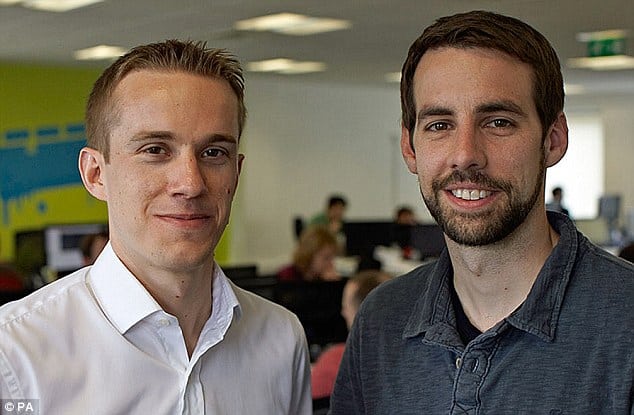App developer named Jon Reynolds has reportedly sold his Predictive text app SwiftKey to Microsoft for a $250 million. According to Dailymail Jon Reynolds founded his predictive text app with fellow Cambridge graduate Ben Medlock in 2008, when they were both still in their 20s.
SwiftKey uses artificial intelligence to adapt to the way the phone user types, predicting the way in which they use language to save time. The company estimates that since inception, it has saved users almost 10 trillion keystrokes across 100 different languages.
Reynolds was working in the civil service as a graduate, when he was inspired by the idea for SwiftKey.
He says: ‘My first job was in science policy and I was in a meeting and I could see a partner typing on a BlackBerry in a fat-fingered way.
Originally we had the traditional typewriter, but that Qwerty format shrunk down is hard to use.
‘With SwiftKey you can adapt the keyboard to suit your style and we felt we had the opportunity to make that massive.’
The pair were awarded an initial £15,000 loan from government body Innovate UK, which backs Science and Technology entrepreneurs, and then an additional £50,000 to develop the prototype. They left their careers in 2008 to work on the project.

Reynolds says: ‘Ben, my co-founder, had a background in information processing and natural language, and I knew some of the government grants available. We applied to what is now Innovate UK, and that grant got us our first patent and got us off the ground as we didn’t have our own finance.
We went full-time in 2008, launching our first prototype in 2009.’
Although Android phones were very much in their infancy back in 2010, the founders could sense they had potential.
The app launched on Android in 2010 and became available on Apple’s App store from 2014.
Reynolds says: ‘It was a real time of massive change, even though Android only had a 1 per cent market share.
SwiftKey initially charged $4 for the software, but scrapped this in 2014, transitioning to a free download model.
‘We realized there was a lot of demand for our product but we also realized a lot of people around the world did not have credit cards,’ Reynolds says.
‘Between 2012 and 2014 it became clear that the world was changing and every one was using these free models, which did not exist before. You had games like Candy Crush, and I think users got used to downloading apps for free first and expecting to pay later.
‘So we went free but got ten times as many users. At the same time we were working with the likes of Samsung and BlackBerry.’ SwiftKey is now used on more than 300 million devices. And beyond phones, the predictive technology is even used to form part of Stephen Hawking’s communication system.
The professor, who has motor neurone disease, communicates by twitching a muscle in his cheek. This technology allows him to express whole words at a time rather than typing out individual characters.
SwiftKey has also developed a symbols-based communication app for individuals with learning difficulties.

Leave a Reply